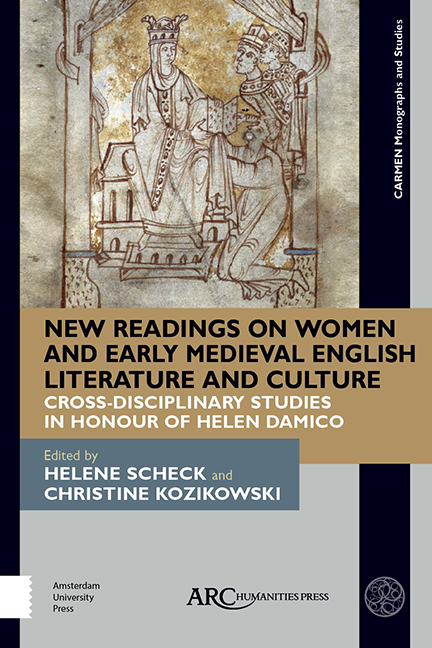 New Readings on Women and Early Medieval English Literature and Culture
New Readings on Women and Early Medieval English Literature and Culture Book contents
- Frontmatter
- Contents
- List of Illustrations
- List of Abbreviations
- Note from the Editors
- Introduction: Feminism and Early English Studies Now
- PART ONE LITERACY AND MATERIAL CULTURE
- PART TWO ENGENDERING MARRIAGE AND FAMILY
- PART THREE WOMEN OF THE BEOWULF MANUSCRIPT
- PART FOUR WOMEN AND ANGLO-SAXON STUDIES
- Select Bibliography
- Index of Manuscripts
- General Index
5 - A Textbook Stance on Marriage: The Versus ad coniugem in Anglo-Saxon England
Published online by Cambridge University Press: 20 November 2020
- Frontmatter
- Contents
- List of Illustrations
- List of Abbreviations
- Note from the Editors
- Introduction: Feminism and Early English Studies Now
- PART ONE LITERACY AND MATERIAL CULTURE
- PART TWO ENGENDERING MARRIAGE AND FAMILY
- PART THREE WOMEN OF THE BEOWULF MANUSCRIPT
- PART FOUR WOMEN AND ANGLO-SAXON STUDIES
- Select Bibliography
- Index of Manuscripts
- General Index
Summary
THE FINAL LINES of a 122- line late Latin poem include this warm and personal plea from the speaker to his “fida comes”:
Tu modo, fida comes, mecum isti accingere pugnae,
quam Deus infirmo praebuit auxilium.
Sollicita luctum cohibe, solare dolentem:
exemplum vitae simus uterque piae.
Custos esto tui custodis, mutua redde.
(Now you, faithful companion, with me prepare yourself for battle, [you] whom God has provided as a help for the weak. Console me, worried and mourning: let us each be an example of the pious life. Be guardian of your guardian, mutually restoring [or, give back what you receive].)
In distinctly companionate terms here and elsewhere in the poem, the speaker asks his audience to join him in adopting an “exemplum vitae,” although the argument includes expression of the speaker's own weaknesses and his need for his companion's support. The poem is both intimate and external in its interests as it contrasts personal harmony with public disruptions, and while the speaker advocates celibacy, he does so from the perspective of one familiar with— and not entirely rejecting now— the power of physical comfort. Such features make the poem, despite its emphasis on celibacy and more generally on Augustinian ideals, seem a somewhat odd inclusion as a core part of monastic education in Anglo-Saxon England, a context in which its view of marriage enriches and moderates the arguments for celibate marriage laid out by such powerful Anglo-Saxon voices as those of Aldhelm and Ælfric.
The poem, known by various titles including Carmen ad uxorem and Versus ad coniugem, was probably composed by Prosper of Aquitaine in the first half of the fifth century. The attribution to Prosper has long been debated and was most recently rejected by Alexander Hwang in 2009, for whom the strongest ground regarding the attribution is comparative and highlights the emotional power of the poem. Hwang, after surveying the evidence for authorship, concludes that “such a deeply personal poem is completely uncharacteristic of Prosper.” Stefania Santelia, however, in her recent edition of the poem (also 2009), strongly reasserts Prosper's authorship, and her view has been supported by Jérémy Delmulle's subsequent study focused on “Establishing an Authentic List of Prosper's Works.”
- Type
- Chapter
- Information
- New Readings on Women and Early Medieval English Literature and CultureCross-Disciplinary Studies in Honour of Helen Damico, pp. 97 - 112Publisher: Amsterdam University PressPrint publication year: 2019


